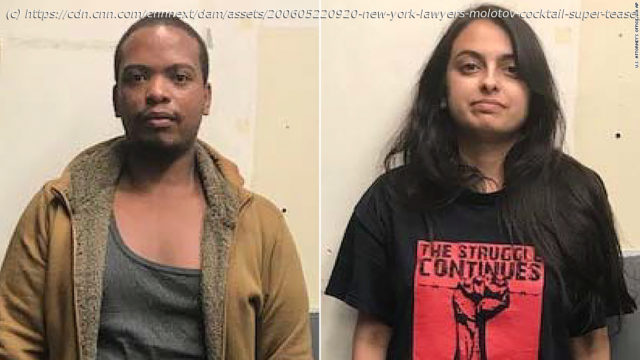On an early October evening in 2014, a group of New York University law school students gathered for a joint birthday party at (Le) Poisson Rouge, a popular bar and music venue a few blocks from campus.
New YorkOn an early October evening in 2014, a group of New York University law school students gathered for a joint birthday party at (Le) Poisson Rouge, a popular bar and music venue a few blocks from campus.
One of the birthday celebrants, Colinford Mattis, quickly hit it off with another guest, Urooj Rahman, who was studying law at Fordham. Both raised in Brooklyn, the two bonded over their professional interest in human rights and their engagement in local politics, becoming friends from there on.
Today, Mattis,32, and Rahman,31, are in jail, facing federal charges alleging they participated in a Molotov cocktail attack on an empty New York Police Department vehicle during protests sparked by the killing of George Floyd in Minneapolis.
The promising young lawyers with enviable educational pedigrees and significant familial responsibilities — he is raising three foster children; she is the primary caretaker for her elderly mother — suddenly find themselves detainees indicted on seven federal felony charges for which they face life in prison. Their predicament has puzzled not only family and friends, but also prosecutors themselves.
„He’s a person with an extraordinary career that was just starting in the law. He attended prestigious universities, he had some of the best education that you can have in this country and yet he risked everything — everything — to drive around in a car with Molotov cocktails attacking police vehicles,“ federal prosecutor Ian Richardson said during one of Mattis’s initial court appearances.
Read More
„It is difficult for me, frankly,“ Richardson later added, „to comprehend how somebody in his position with his background would do what he did.“
A former colleague of Rahman’s, Alicia Bella, said she couldn’t reconcile the charges with the person she knew. „I’m very surprised. My heart goes out to her, and I want to do everything I can to help her,“ she said. „I know what this country does to people who express themselves. I’m definitely worried.“
Prosecutors say the two lawyers drove Mattis’s tan minivan late in the evening of May 29 to participate in widespread protests in Brooklyn’s Fort Greene neighborhood. There, just before 1 a.m. on May 30, Rahman approached an empty NYPD vehicle with an already broken window and tossed in a makeshift explosive device, according to court filings. She also „attempted to distribute Molotov cocktails to several other individuals and to incite them to use the Molotov cocktails in the course of the protests.“
The van, driven by Mattis, then „fled the scene,“ court documents say, and shortly thereafter police stopped the vehicle and found „precursor items“ to build explosives, including a lighter, a Bud Light bottle stuffed with toilet paper and a gasoline tank. Both Mattis and Rahman have been indicted on charges including use of explosives, arson and civil disorder. They haven’t entered a plea.
Though the alleged actions of the two did not cause physical harm to any individual, their behavior, as described by prosecutors, came at the height of both the protests that swept the city and an eruption of destructive looting and property damage that sparked days of tension between police and those who had taken to the streets.
By all accounts, their alleged actions stand in contrast to their nature.
According to their friends and lawyers and a review of their professional experiences and personal lives, Mattis and Rahman are lifelong social justice advocates with deep interests in civil rights and police reform, but neither displayed signs that they might engage in the sort of violent outburst of which they are accused.
‚He always wanted to use a law degree to do good in this world‘
Mattis was raised and attended public school in East New York, a section of Brooklyn that has among the highest crime rates and lowest-performing schools in the city, according to public records.
He went on to attend St. Andrew’s Episcopal School, a prestigious private institution in Potomac, Maryland, where he published an essay for the school magazine that signaled his nascent interest in social and economic justice issues.
He wrote that, inspired by his colonial history class and the Kanye West song „Diamonds from Sierra Leone,“ he had organized a forum on the trade of blood diamonds.
„As I researched the brutality of mining diamonds and lack of compensation, I was reminded of my time working at a fair trade coffee cooperative in Mexico over the summer,“ he wrote. „There I learned the values of fair trade, and met the people who make an inexpensive commodity that Americans just consume.
Start
United States
USA — mix How two promising lawyers found themselves facing life in prison for alleged...






